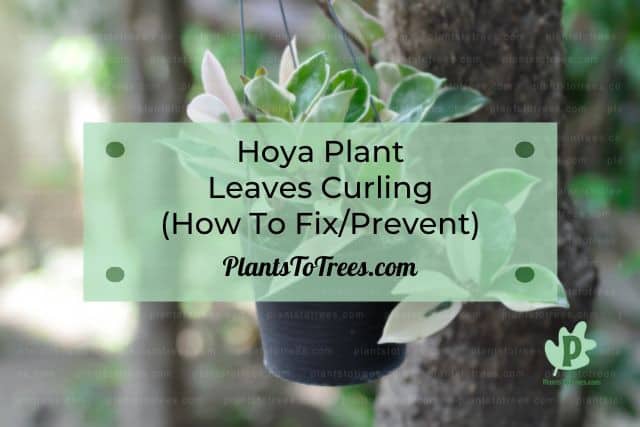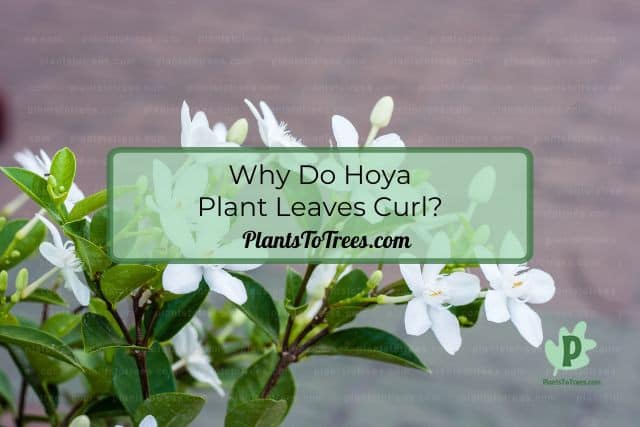Hoya plants are fairly easy to care for, requiring only a few basic needs to ensure it is healthy and happy. If you don’t provide these needs, the plant will begin to show you signs that something is wrong. One of the first symptoms is that the leaves will begin to curl.

To prevent Hoya plant leaves from curling, make sure the plant is receiving temperatures no higher than 85 degrees, keep the soil moist but not soggy, increase humidity levels to at least 50 percent, and indirect sunlight.
Veering away from these needs will cause leaf curling, leaf drop, leaf discoloration, and stunted growth. If you continue to allow the leaf curling to go on without intervening, more symptoms will start to appear. Depending on what the underlying cause of the problem is, your Hoya could also begin to wilt, experience leaf discoloration and leaf drop, have stunted or slowed growth, and even die.
How you deal with Hoya plant leaves curling – how to fix/prevent can make or break the plant. If you simply ignore the problem, it will only get worse. Leaf curl does not go away on its own, and leads to more serious problems.
Why Do Hoya Plant Leaves Curl?

Leaf curling is often the first sign that something is wrong with your Hoya plant. If your Hoya’s leaves are curling, it’s time to take a closer examination of the plant to determine what could be wrong.
Hoya plant leaves curling is a sign that there is an issue with your houseplant. In most cases, it is because the Hoya isn’t receiving enough water or is being subjected to extremely dry conditions. Thankfully, these are relatively simple issues to fix.
Underwatering The Hoya Can Cause Its Leaves To Curl
Hoyas don’t like their soil to stay dry for too long. In fact, they prefer it if their soil stays damp but not soggy. If you lapse in their watering needs, the leaves will begin to dry out and curl. To confirm this is the cause, look at the soil. If it is pulling away from the pot, then you know for sure its soil is too dry.
To correct the problem, submerge the Hoya’s pot in water and let it soak for 20 to 30 minutes. After this allotted time has passed, lift the pot out of the water and let the excess water drain out of the pot. Once it’s all drained, place the Hoya back in its location.
Giving The Hoya Too Much Water Can Result In Leaf Curl
While not enough water can cause issues, so can giving the Hoya too much water. While leaf curling is more common with underwatering, it can also occur when you have overwatered the Hoya. What’s even worse is that overwatering can lead to root rot, which is a serious and potentially fatal houseplant disease.
Thankfully, overwatering is completely preventable and only requires checking the soil dryness before watering. If the soil still feels damp, wait a day or two before checking again. Water the plant when the soil feels dry.
Humidity Levels Are Too Low
The average humidity level in most homes is around 40 percent. This is, unfortunately, too low for tropical houseplants such as Hoyas. Low humidity levels will cause the leaves of the Hoya to curl and dry. To fix this problem, and prevent it from reoccurring, increase the humidity level to at least 50 percent. Drip trays and humidifiers are two of the best ways to increase the humidity level in the room.
Temperatures In The Room Are Too High
Temperature shock can also cause the Hoya plant leaves to curl, and this can occur if the plant is exposed to temps that are above 85 degrees. This high level of temperature will quickly dry out the plant and cause it to go into shock.
Make sure the Hoya is growing in an area where the temperatures are no less than 60 degrees and no more than 85 degrees. Additionally, keep the Hoya away from areas where the temperature drastically fluctuates, such as underneath a heating/cooling vent or next to an exterior door.
The Hoya Is In Shock From Transplanting
If you have recently transplanted or repotted the Hoya, then the leaves curling could simply be shock caused by the process. This is a common occurrence and usually one that corrects itself as long as the plant’s other needs are met.
You can help prevent shock by making sure the Hoya is well watered before transplanting, while also only transplanting during the plant’s active growing period.
Conditions Where The Hoya Is Growing Are Too Dry
There are times throughout the year when your home can be drier than normal. This means higher temps combined with low humidity levels. When this occurs, simply lowering the temps and increasing the humidity level may not be enough to stop the leaf curling.
The article owner is Plants To Trees dot Com and this article was first published on February 27, 2023.
Thankfully, you can help fix these dry conditions by misting the plant’s leaves. Remember, however, that you should also ensure the temperature is not higher than 85 degrees and the humidity level is 50 percent or above. Simply fixing one of the issues may not provide you with the results you desire, but addressing all the things that can lead to dry conditions can quickly stop the leaf curling.
Related Articles
Hoya Plant Leaves Turning Yellow And Brown – How To Fix/Prevent
Hoya Plant Leaves Drying Out – How To Fix/Prevent
Do Hoya Leaves Grow Back After Losing All Its Leaves?
Christmas Cactus To Have Droopy Leaves – How To Fix/Prevent
PlantsToTrees.com is the owner of this article and we first published this on February 27, 2023.
Christmas Cactus Turning Purple And Limp – How To Fix/Prevent
